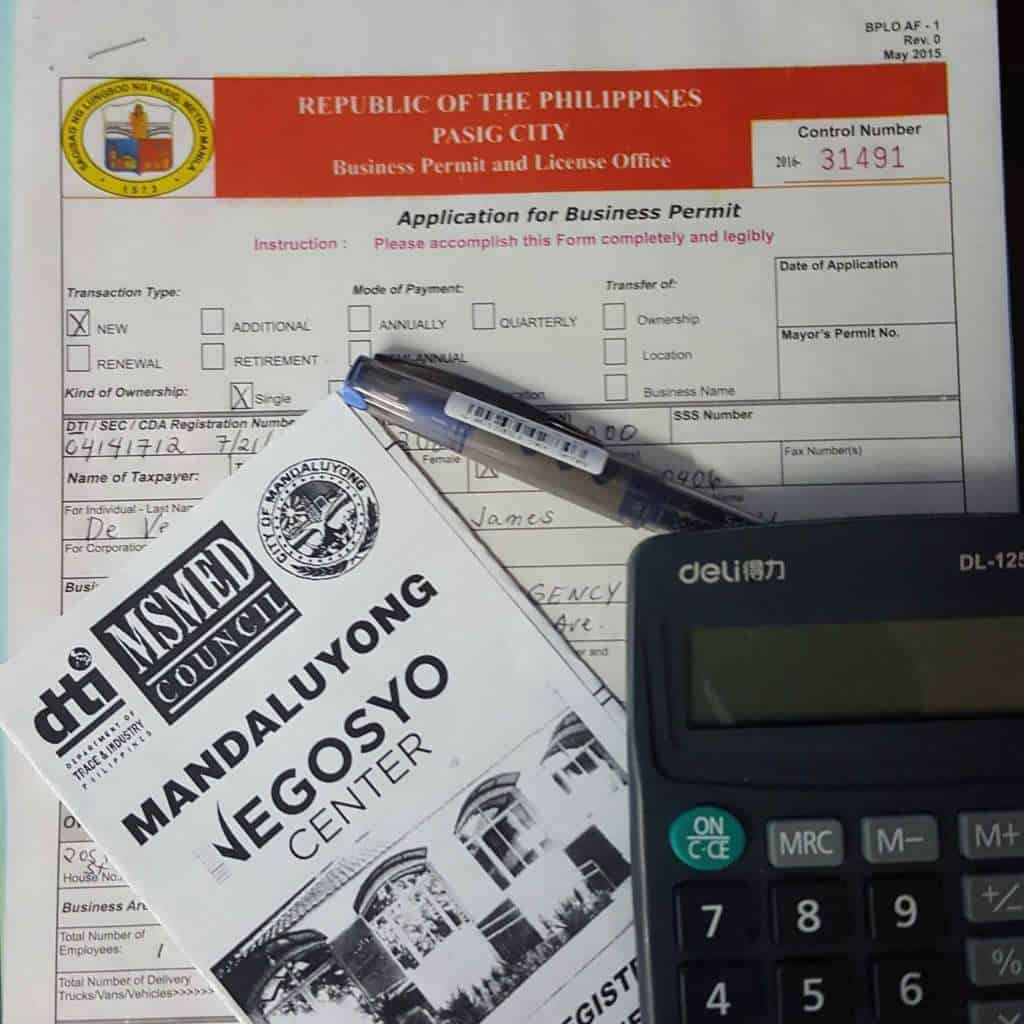Before commencing your business in the Philippines, you need to secure a Business permit or Mayor’s permit, as it is commonly called, from your local government where your business is located. Here are some notes on business permits:
• Business permits expire on the 31st of December unless the permits are issued on a quarterly basis.
• Must be renewed before the end of January.
• Different requirements per city.
• For new applications, the requirements usually are: barangay clearance, zoning clearance, environmental permit to operate, fire clearance, etc.
• To secure these licenses, the requirements usually are articles of incorporation for corporation, articles of partnership for partnership and DTI registration for sole proprietorships,
• accomplished form
• Lease contract or proof of ownership
• Sketch of the Location
• Fire Safety Clearance
Please note that some businesses require special permits before they can be granted a business permit. Examples of such are:
1. Security agency – PNP permit
2. Rice retailer (a only), bakery (a & b) and drug store (b only).
a. NFA permit
b. Bureau of Food and Drug Administration (BFAD) Permit
3. Certification of exemption if exempted under any law or decree.
4. Theater/movie houses – Certified certification of registration from the movie and television review and classification board (MTRCB).
5. Sales and rentals of video tapes – Registration from Videogram Regulatory Board (VRB).
6. Gasoline station – Energy regulatory board (ERB) registration.
7. Factories / private market / commercial building / importer and exporter warehouse / garments sub-contractor – Certificate of Occupancy .
8. Factories pertaining to air / water pollution – Department of Environment and Natural Resources (DENR) clearance.
9. Buy and sell – police clearance.
10. Real estate lessor – Sworn statement of the assessed value of real property as indicated in the real property tax declaration and current real property tax payment official receipt.
11. Local employment – Certification from Philippine Overseas Employment Agency (POEA).
12. Talent promotion – Philippine Overseas Employment Agency (POEA) permit.
13. Training center – Certification letter from accredited agency.
14. Crewing / manning / shipping / agency – Philippine Overseas Employment Agency (POEA) permit.
15. Travel agency – Permit from the Department of tourism.
16. Pawnshop/bank / lending investors – Indorsement from central bank.
17. Water dealers/ water delivery/ water drilling – Permit from National Water Resources Board (NWRB).
18. School – Department of Education, Culture and Sports (DECS) permit.
19. Firecrackers and pyrotechnic devices – dilg / pnp permit.
20. Taxi / bus / jeepney operation – LTO franchise indicating number of units.
21. Receiving home, orphanage – Department of Social Welfare and Development (DSWD) registration.
22. Dental phosthetic laboratory – License to operate from the Department of Health (DOH).
These requirements sometimes vary depending on the city government.
The usual procedure in securing a business permit is as follows:
1. Secure a barangay clearance- requirements usually are: duly filled out form, AOI or DTI Registration; lease contract, pictures of the establishment. Other requirements are imposed (in Pasig Bgy. San Antonio, they require insurance)
2. After getting the barangay clearance, you proceed to the city hall (BPLO Business Permit and Licensing Office) where they will give you a form to fill up. You must submit the duly filled up and notarized form.
3. Go to the Engineering Department to get the assessment for building fee (they will ask for the building and occupancy permit). Then proceed to Electrical Department for assessment (they will require mechanical and electrical permit )
4. Go to BPLO so they can check the requirements, have the assessment and fees encoded and also to check any violations or penalties. The EDP will issue the Order of Payment.
5. Procure cedula.
6. Go to Treasury department then pay the fees.
7. You then proceed to the Health and Sanitary Office where you will secure the Health and Sanitary Permit (In Pasig, they require a drug test and X-ray for all the employees). They will also require attendance in a seminar
8. You go to CENRO (City Environment and Natural Resources Office) to secure an Environmental Permit (usual requirement is Affidavit of Undertaking).
9. Then off to the BFP (Bureau of Fire Protection) for the Fire Permit Fee. Take note that all business establishments are required to have a fire extinguisher. The number of fire extinguishers will depend on the floor area of the establishment. An inspection by the BFP will be conducted before the issuance of the clearance. They will issue a Fire Safety Inspection Certificate.
10. Some LGUs do not conduct inspection anymore but rather require pictures of the establishment.
11. After all these permits are secured, then the business license is issued. However, in some cities, they issue the business permit temporarily subject to the issuance of the other permits (Sanitary permit, Fire Certificate).
For further inquiries, you may seek legal assistance by e-mailing us at info@ndvlaw.com.
Nicolas & De Vega Law Offices is a full service law firm in the Philippines. You may visit us at the 16th Flr., Suite 1607 AIC Burgundy Empire Tower, ADB Ave., Ortigas Center, 1605 Pasig City, Metro Manila, Philippines. You may also call us at +632 4706126, +632 4706130, +632 4016392.

